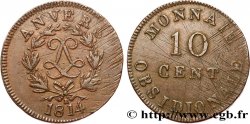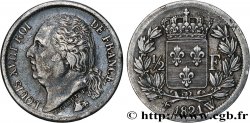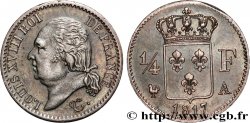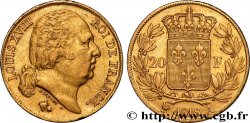fme_443749 - LOUIS XVIII Médaille, François de Malherbe, Académie des Sciences, Arts et Belles-Lettres
недоступный.
Товар уже продан в нашем интернет-магазине (2020)
Цена: : 75.00 €
Товар уже продан в нашем интернет-магазине (2020)
Цена: : 75.00 €
Тип Médaille, François de Malherbe, Académie des Sciences, Arts et Belles-Lettres
Дата: 1815
Монетный двор / Город: 14 - Caen
Металл: bronze
Диаметр: 27,15 mm
Ориентация осей монеты: 12 h.
Гравер GATTEAUX Jacques-Édouard (1788-1881)
Вес: 9,6 g.
Век: lisse
Комментарии о состоянии
Agréable médaille mais avec des traces d’usure et une patine hétérogène
Лицевая сторона
Аверс: легенда: ENFIN MALHERBE - VINT.
Аверс: описание: Buste lauré de Malherbe à gauche.
Обратная сторона
Реверс: легенда: ACADÉMIE DES SCIENCES ARTS ET BELLES LETTRES DE CAEN // ÉTUDE ET AMITIÉ.
Реверс: Описание: Légende circulaire et en trois lignes horizontales.
Комментарий
François de Malherbe est un poète français, né à Caen vers 1555 et mort à Paris le 16 octobre 1628. Il est le fils de François, écuyer, seigneur de Digny, conseiller au bailliage et présidial de Caen, et de Louise Le Vallois.
Poète officiel de 1605 à 1628, son évolution de la magnificence à la sobriété traduit le passage du goût baroque au goût classique, amenant la poésie vers un grand dépouillement. Son influence a été considérable sur la poésie française. Bien qu'il n'ait pas écrit d'art poétique, une doctrine était tirée de ses œuvres, de ses annotations sur son exemplaire des poésies de Philippe Desportes et des remarques orales rapportées par ses contemporains. Ce sont notamment ses disciples François Maynard et Honorat de Bueil de Racan qui, suivant leur maître, créent le corpus louant « l'harmonie classique », qui prédominera pendant près d'un siècle.
Durant tout le XVIIe siècle, Malherbe est la référence majeure des théoriciens classiques. Dans son Art Poétique (1674), Nicolas Boileau le loue avec ferveur, commençant son éloge par le célèbre hémistiche « Enfin Malherbe vint »..
Poète officiel de 1605 à 1628, son évolution de la magnificence à la sobriété traduit le passage du goût baroque au goût classique, amenant la poésie vers un grand dépouillement. Son influence a été considérable sur la poésie française. Bien qu'il n'ait pas écrit d'art poétique, une doctrine était tirée de ses œuvres, de ses annotations sur son exemplaire des poésies de Philippe Desportes et des remarques orales rapportées par ses contemporains. Ce sont notamment ses disciples François Maynard et Honorat de Bueil de Racan qui, suivant leur maître, créent le corpus louant « l'harmonie classique », qui prédominera pendant près d'un siècle.
Durant tout le XVIIe siècle, Malherbe est la référence majeure des théoriciens classiques. Dans son Art Poétique (1674), Nicolas Boileau le loue avec ferveur, commençant son éloge par le célèbre hémistiche « Enfin Malherbe vint »..








 Cообщить об ошибке
Cообщить об ошибке Распечатать страницу
Распечатать страницу Отправить мой выбор
Отправить мой выбор Задать вопрос
Задать вопрос Consign / sell
Consign / sell
 Информация
Информация



